Trump’s terror silences the Mexican border
The US government’s hardline rhetoric against immigration has succeeded in reducing irregular crossings. ‘It’s no secret that this president likes to separate families,’ says a Venezuelan woman
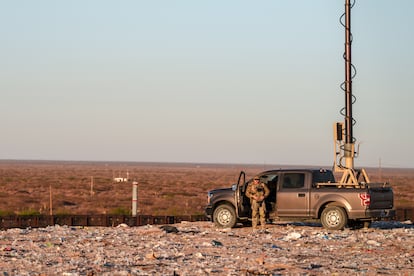

At the highest point of a garbage dump, a lone U.S. soldier keeps watch over his country’s border with Mexico. Minutes before 7 a.m., the only movement comes from the trucks transporting maquiladora workers on the Mexican side. Just a few meters from the soldier are a couple of Strykers — armored combat vehicles deployed in early April to patrol the line. These are fast-moving tanks with room for nine soldiers, but this April morning, they sit empty, part of a sleepy dawn at a location that, until recently, was one of the hottest flashpoints on the planet. Today, fear hangs in the air.
From this vantage point in the city of Sunland Park, New Mexico, you can see miles of the border wall — tons of steel from President Donald Trump’s wall, which his predecessor, Democrat Joe Biden, tried to sell off as scrap in the final days of his term. The wall was one of Trump’s obsessions during his first term. Now, in his return to the White House, the Republican has deployed a much more effective barrier: fear. It’s a powerful tool made up of a long list of threats — from the 6,100 troops stationed at the border, to visa cancellations, to the daily hunt for undocumented immigrants carried out across the country.
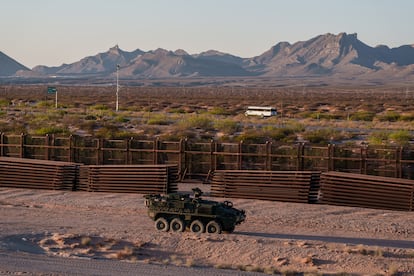
In March, Washington boasted of achieving the lowest number of irregular crossings in decades — just 7,100. It was the second consecutive month of decline for the Trump administration, and marked one of the periods with the least border traffic in recent U.S. history. The figure represents a 92% drop compared to December 2024, the last full month of Biden’s presidency.
The climate of fear and persecution has been enough to break Cristina. Life for this undocumented Brazilian woman — who asks not to use her real name out of fear — hasn’t been the same since last February, when nine patrol cars and 18 immigration police officers arrived at her home, intent on detaining and deporting her. “Your children can stay here, but you can’t,” two Immigration and Customs Enforcement (ICE) officers told her. When they entered the trailer where the family lives, they were met with a surprise. A 20-day-old baby was asleep in a crib. Cristina couldn’t travel because she had just given birth.
Since then, Cristina, 33, has been living like a prisoner on parole. She wears a bracelet on her left wrist that sends her geolocation information to the authorities at all times. “Sometimes they’ve called me at 2 a.m. or 3 a.m. because they can’t get the signal and want to know if I’ve escaped. They ask me to leave the house and stretch my arm toward the sky so they can locate me,” Cristina says.
Originally from the state of Minas Gerais, she arrived in the U.S. at the end of 2019, during Trump’s penultimate year in office. Today, the same president is in power, but the situation is very different. “He wasn’t as crazy as he is now,” she says.
Cristina has decided to give up her fight to remain in the U.S., where she works as a restaurant waitress for $10 an hour. “I didn’t come looking for wealth or gold; I just want to spare my children a life of suffering,” says the Brazilian woman, who grew up on the streets after being abandoned by her mother. Her children range in age from two months to 13 years. She is waiting for the Brazilian government to issue papers for her two youngest children so they can head south.
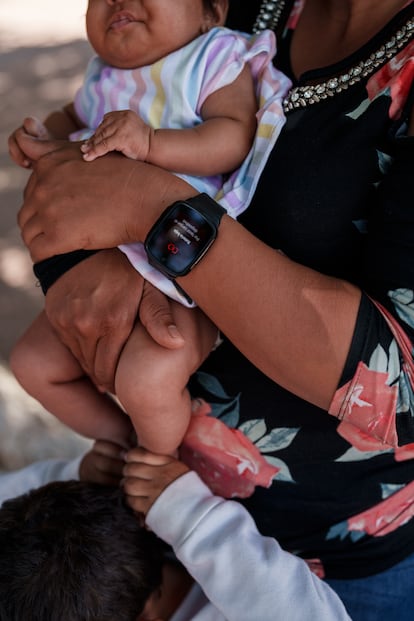
Family separation
“It’s no secret that this president likes to separate families,” says Oriana, a 30-year-old Venezuelan migrant living east of El Paso who doesn’t want to use her last name, also out of fear. Losing her family is her greatest fear. Her phone’s wallpaper is a photo from last Christmas — she’s visibly pregnant, standing with her three children in front of a tall pine tree dusted with artificial snow. Completing the holiday scene is her husband, Luis, a tall, powerful man in a baseball cap, grinning from ear to ear.
“We had no idea what was coming,” Oriana admits. “I’ll show you what Luis is doing now,” she says, searching for a video on her phone.
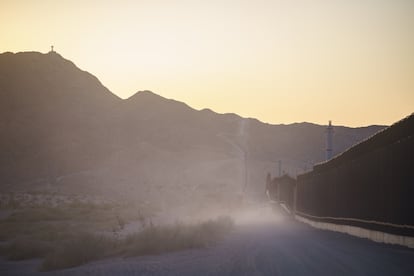
Seconds later, she plays a video. The same good-natured man from the Christmas photo now appears hoeing the soil in the distant Venezuelan region of Anzoátegui. Luis fled the U.S. in early March to avoid being hunted down and deported by immigration officers. He self-deported amid the incessant news about arrests and deportations of people like him. Since mid-March, the Trump administration has sent 288 people — 252 Venezuelans and 36 Salvadorans — to Nayib Bukele’s maximum-security prison in El Salvador.
“We never imagined we’d ever feel the way we did in Venezuela again: persecuted. You feel guilty for something you didn’t do,” says Oriana, who avoids going out. “I only go to pick up the kids from school. And I get my groceries delivered to my house.”
Trump’s draconian measures against migration have stirred up palpable unease in downtown El Paso. Dozens of stores were closed this week in what was once a key shopping area for people crossing over from Ciudad Juárez. The shops that remain open make no secret of the tough times they’re going through.
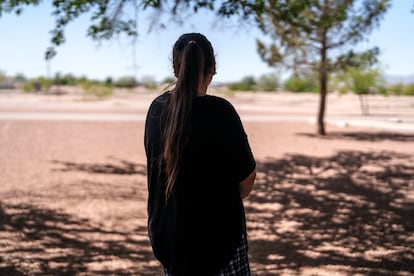
“There are a lot of political issues; people don’t want to cross the border anymore, not even with a visa!” says Jasmine, a Korean immigrant who has run a clothing store selling imports from China for 20 years. Next month, she’ll be shutting down, as the business has taken hit after hit since the pandemic. “Our main customers were from Mexico, and now the tariffs are going to make things worse for us; it’s impossible to compete with Shein and Temu,” she says.
Shelters nearly empty
In El Paso, there are barely any signs left of the border crisis that once dominated the city. A woman selling arepas waits on the corner outside the Sacred Heart shelter, which had taken in hundreds of Venezuelans since 2022 and shut its doors in October. Across the border, the situation is similar. Migrant shelters in Ciudad Juárez are seeing record lows. At Gracia Abundante, in the city center, only 25 beds are occupied — compared to 200 in December. The manager explains the reason in just two words: “Donald Trump.”
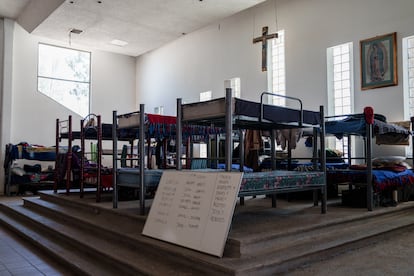
“The smugglers are making a killing. If crossing used to cost you $5,000, now they’re charging $10,000,” explains Ivonne López, one of the most veteran volunteers at La Casa de Migrantes, a Church-run organization that has been operating in Ciudad Juárez for 35 years. “Today we have 38 people. ItThat’s not a number you see around here very often,” she reflects. Not so long ago, the shelter housed between 400 and 500 people. And it hosted more 1,100 people when the Central American caravans began challenging Trump during his first presidency.
Many at La Casa del Migrante have abandoned the idea of crossing into the United States and are preparing to return to their countries of origin, facilitated by the International Organization for Migration, a U.N. agency. A few, however, are unwilling to give up, since they are so close to that land of promise.
“It’s a really bad right now, but I still have hope of crossing,” says 18-year-old Eduardo García. The young Guatemalan sits on a sofa, avoiding eye contact with the person asking him to share his story. He’s wearing shorts that reveal the scar left by his experience as a migrant.
“The bullet entered here,” he says, pointing with his finger at his left calf. “It exploded and then came out here,” he adds, moving his finger up to his thigh.
It was October 2023. The boy was aboard a van with 10 other migrants like himself. The group was heading toward the border when Mexican soldiers ordered them to stop in the city of Parral, Chihuahua. The vehicle didn’t stop and fled. The soldiers opened fire. A bullet hit Eduardo, who was just 16 at the time.
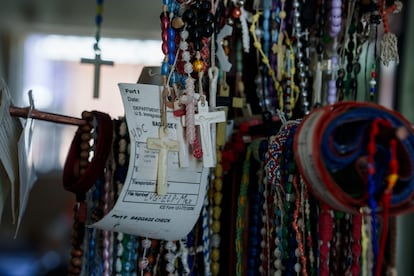
More than a year and a half has passed since then. Eduardo is still recovering from the incident at the shelter. His father, Isaías, 47, traveled from Chimaltenango, just outside Guatemala City, to be with him during his recovery. The Mexican government is covering the expenses through the Victim Assistance Commission.
“I tell him that we have to accept what happened. It didn’t work out, and that’s all there is to it, but he wants to pursue that dream,” says Isaías, who sold a house to fund Eduardo’s journey north. Eduardo remains undecided, but he hasn’t ruled out facing Donald Trump’s great wall once again.
Sign up for our weekly newsletter to get more English-language news coverage from EL PAÍS USA Edition
Tu suscripción se está usando en otro dispositivo
¿Quieres añadir otro usuario a tu suscripción?
Si continúas leyendo en este dispositivo, no se podrá leer en el otro.
FlechaTu suscripción se está usando en otro dispositivo y solo puedes acceder a EL PAÍS desde un dispositivo a la vez.
Si quieres compartir tu cuenta, cambia tu suscripción a la modalidad Premium, así podrás añadir otro usuario. Cada uno accederá con su propia cuenta de email, lo que os permitirá personalizar vuestra experiencia en EL PAÍS.
¿Tienes una suscripción de empresa? Accede aquí para contratar más cuentas.
En el caso de no saber quién está usando tu cuenta, te recomendamos cambiar tu contraseña aquí.
Si decides continuar compartiendo tu cuenta, este mensaje se mostrará en tu dispositivo y en el de la otra persona que está usando tu cuenta de forma indefinida, afectando a tu experiencia de lectura. Puedes consultar aquí los términos y condiciones de la suscripción digital.








































